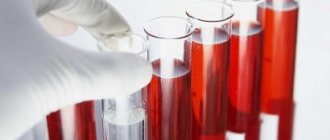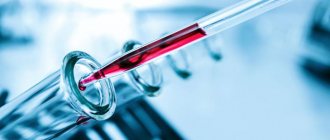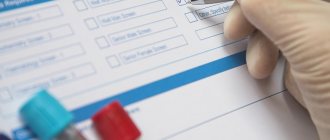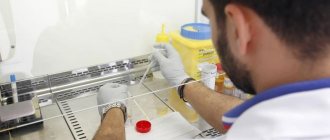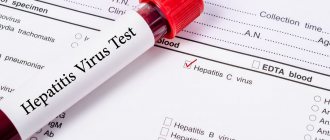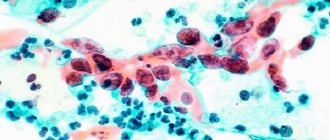How long is a previously taken blood or urine test valid? This information allows the doctor to judge the patient’s health status as accurately as possible. The latter, having such important knowledge, will save himself from the need to visit the laboratory once again.
The timing differs for different samples, and below we will provide data on the main, most common ones.
Diagnosis of diseases using laboratory blood tests
Thanks to its unique properties, blood allows one to diagnose the functioning of almost all organs and systems of the body, and during a woman’s pregnancy it also provides information about the state of the fetus’s body. Blood tests, the timing of which are within normal limits, make it possible to determine abnormalities, changes in the composition of the blood and diagnose diseases in the early stages, and monitor the course of the disease.
Blood sampling for testing is usually done from a finger or a vein. No special preparation is required to donate blood during the test, but a common condition is to draw blood early in the morning on an empty stomach. In all medical institutions, blood sampling from a finger or from a vein for analysis is carried out by qualified specialists. Some experts recommend taking blood for analysis only from a vein, as they consider this method to be more reliable and accurate for a number of reasons.
How to store urine until it is sent to the laboratory
Urine is a perishable product because it consists of a large amount of organic and inorganic substances that break down into simple components. Some of them react with each other, which negatively affects the composition of the liquid. Irreversible changes begin to occur after a few hours.
As a result, the biomaterial becomes unsuitable for analysis, and its indicators become uninformative.
There are certain requirements for urine collected for analysis. The main one is collecting material in the morning after waking up. But sometimes, due to circumstances or the inability to quickly get to the laboratory, it becomes necessary to preserve the biofluid for several hours.
At room temperature
Storage of urine that was excreted in the morning is allowed at room temperature for a couple of hours. Long-term maintenance of the biomaterial prepared for research causes changes in its basic characteristics. Urine collected for research using the following methods cannot be refrigerated.
General analysis. Available in the morning. Delivery is required within an hour.
Nechiporenko test. The collection is carried out immediately after waking up and is stored for no more than 60 minutes.
In a refrigerator
The best option is to keep the collected sample in a cool place. For this purpose, experts recommend using a refrigerator. At a temperature of +3...+4°C, urine can be stored for several hours. It should be remembered that greater cooling can provoke the formation of insoluble sediment, and an increase can lead to the formation of a decomposition reaction of organic substances.
It is important to know! The exception is the Zimnitsky test. For him, keeping the urinary fluid in a cool place is allowed for 24 hours, after which he must be transported to a medical facility. It is permissible to send liquid intended for daily sugar analysis into the refrigerator.
Expiration dates and readiness dates for blood tests
The timing of blood tests is influenced by several factors:
- type of laboratory test;
- level of technological equipment of the laboratory;
- specifics of the study (number and properties of specified indicators for diagnosis).
The timing of blood tests also depends on the requirements and capabilities of the clinic. Some medical organizations are reducing the average shelf life of blood tests, while others are increasing them.
Most modern clinics, equipped with the latest medical equipment, conduct full examinations and provide blood test results within one day, and in some cases you can receive the test result in your hands within 1-2 hours. But at the same time, in most public clinics the same studies can be carried out within 5–7 days. It turns out that the timing of blood tests directly depends on the choice of laboratory and the cost of the study .
Certain generally established limits for the shelf life of blood tests are indicated. However, here, too, various variations can occur, when the period of blood tests can be shortened or increased. Typically, medical institutions inform their patients about the types of blood tests and their expiration dates in leaflets and on information stands.
Let us consider the timing of blood tests for the main types of studies in more detail.
Clinical (general) blood test
The most common analysis, and it is one of the most important diagnostic methods for therapeutic, gynecological, cardiological, urological, and endocrinological studies.
- The turnaround time for blood tests is 5 days.
- The validity period of the tests is 10–14 days.
Blood chemistry
Allows you to assess the functioning of the main internal organs, provides information about metabolic processes (carbohydrate, protein, lipid metabolism), and also allows you to determine the need for essential microelements.
- Ready time: 4–5 days.
- The shelf life of blood tests is 10–14 days.
Allergy blood test
Gives an idea of the state of the human immune system. Allows you to determine the presence of allergens that cause allergic reactions in the body.
- The turnaround time for blood tests is 5–7 days.
- Blood tests are valid for up to 1 month.
Hormonal studies
They assess the condition of the endocrine organs, help diagnose various hormonal changes and identify diseases of the pancreas, thyroid gland, gonads, and assess the state of fat metabolism.
- The turnaround time for tests is 5–10 days.
- Shelf life – up to 6 months.
Blood tests for HIV infection
They allow detection of antibodies that arise in the body during infection with the human immunodeficiency virus.
- Ready time: 4–5 days.
- Blood tests are valid for up to 6 months.
Blood test for syphilis (RW)
A special type of laboratory blood test. Allows you to determine the presence of a pathogen in the human body.
- The turnaround time for blood tests is 4–8 days.
- Shelf life – from 20 days to 3 months.
Blood tests for markers of viral hepatitis groups B, C, D, E
Laboratory tests to determine the presence of antibodies to hepatitis viruses.
- The turnaround time for tests is 4–5 days.
- Blood tests are valid for up to 3 months.
Blood sugar test
The main type of study for diagnosing diabetes mellitus.
- Ready time: 1–4 days.
- The shelf life of blood tests is 10–15 days.
Analysis for fungal and parasitic infections
Determines the presence of antibodies to protozoan parasites and fungi.
- The turnaround time for blood tests is 4-8 days.
- Tests are valid for up to 6 months.
You can take blood tests to check your own health at any private clinic, of which there are many in any city. However, the results of the analysis are for informational purposes only and cannot serve as a diagnosis of any disease. To obtain more detailed information and prescribe qualified treatment, you need to contact a specialist and get a face-to-face consultation with a good doctor. The timing of blood tests is limited, for this reason you should promptly contact a specialist for interpretation and advice. Otherwise, the tests will have to be retaken. We wish you good health.
How to properly collect urine for analysis
There are several ways to collect urine, depending on the type of study:
- General analysis. An average portion of urine is required. Collection begins a couple of seconds after the start of urination. 50-100 ml of liquid is enough. Having taken the required amount, the container is removed and then emptied completely.
- An analysis that determines kidney disease and the presence of harmful microbes. The first urine sample is taken after waking up, since in the morning microbes, epithelium, and substances that stagnated in the bladder cavity overnight are removed with urine. To collect, take a large glass jar, clean, scalded once with boiling water, and dried. The entire volume of morning urine is collected, mixed, then a small amount is poured into a sterile container.
Before you start collecting the analysis, you need to prepare - wash the perineum and genitals. Sweat, dirt, and secretions will ruin the results. It is advisable to wash without intimate cosmetics, with warm water. Hygiene products contain fragrances, substances that can distort data.
Complete blood test: what does it determine and how many days is it valid?
Laboratory research of human biological material (blood and urine) is the first way to obtain adequate information about the state of health. Already on the first day after birth, the child undergoes a medical examination including these manipulations.
The types of tests taken depend on the reason for the patient’s visit to the doctor:
- presence of disease;
- upcoming surgery;
- preventive medical examination;
- medical commission when applying for a job or in children's institutions (school, kindergarten or camp), for the military registration and enlistment office;
- when passing the medical labor expert commission (VTEK);
- upcoming trip on vacation or for treatment to a sanatorium or resort.
The doctor gives a referral for tests; he decides what and when to take. Blood sampling for research takes place in the treatment room of a clinic or hospital from a finger or a vein, depending on the purpose.
The turnaround time for analyzes varies from one day to several days, depending on what type of study of the material is assigned. The validity period of the results also depends on the type of study.
A general blood test is performed to identify:
- The level of the coloring substance in red blood cells - hemoglobin.
- Erythrocyte sedimentation rate. The study shows how various types of inflammation processes occur.
- The total number of various leukocytes (white blood cells).
- The number of platelets (the smallest cells responsible for the ability of blood to clot).
- The percentage of red blood cells to blood plasma (hematocrit).
- Color blood index (the ratio of red bodies in red blood cells to the norm).
- Presence of harmful microelements (bacteria, parasites and viruses) in the body.
- Allergies.
The norms of digital indicators are adjusted depending on the patient’s age. Only an experienced doctor will determine in which direction to proceed in the future.
The validity period of a general blood test is from ten days to two weeks. When the patient is hospitalized, the shelf life is shortened; it should not exceed ten days. When a child enters kindergarten, the period increases to thirty days. After this time, the tests must be retaken.
Diseases are not diagnosed based on general analysis alone. Its results are indicators of the presence or absence of pathologies in the body and the initial stage for further research.
Stool analysis
Stool analysis is carried out to identify helminth eggs in it. You need to take the test after emptying your bladder to avoid urine getting into it.
Feces should be collected in sterile containers. If, when examining naturally excreted stool, suspicious areas are visible, they should be collected in a container.
A stool test for worm eggs can be collected one day before it is submitted to the laboratory. But the container with the material for analysis must be in a dark place at a temperature of up to +4 degrees Celsius. But the optimal time for submitting the analysis to the laboratory is 40 minutes after receiving it.
The results of this analysis are valid for 10 days .
How to take it correctly
To ensure the objectivity of the research results, when donating blood, the following basic rules are followed:
- Avoid eating for eight hours before your scheduled procedure. Blood is taken on an empty stomach.
- Refrain from cigarettes and alcoholic beverages in the twelve-hour period before submitting the biomaterial.
- If possible, avoid the use of medications.
- Stick to the diet for two to three days.
- Warn the doctor if X-rays or physiotherapeutic procedures were performed on the eve of the test (this is not advisable for research).
The outcome indicators correspond to the symptoms of the disease, so doctors do not recommend delaying the deadline for donating blood for testing. Otherwise, the decryption will be incorrect, which will complicate further actions.
Overdue tests distort the clinical picture of the disease and complicate further treatment. For this reason, it is important to follow the rules and deadlines for donating blood for testing.
How long is a general blood test from a vein valid?
Doctors consider venous blood tests to be the most reliable and accurate.
- Clinical or general.
- Biochemical blood test. Evaluates the performance of internal organs, the normality of metabolic processes and determines the need to replenish microelements.
- Analysis for the presence of allergens and the state of the body's defense system.
- Hormone tests. The functioning of the endocrine system is assessed, deviations in the functioning of its organs are identified.
- Tests for HIV infection.
- Test for syphilis (RW).
- Tests for markers of the HBV, HCV, HDV and HEV viruses.
- Tests for sugar.
- Studying blood for infections of fungal and parasitic etiology.
How long do urine test results last?
To diagnose diseases and general health, laboratory tests of urine are indispensable. Doctors prescribe urine testing when a patient comes in for an illness or during routine examinations. A special group includes pregnant women and children. They take tests regularly according to the prescribed schedule in order to not miss changes in their health.
The main purpose of this type of research is if a patient is suspected of having pathologies of the kidneys, urination and urinary system. The laboratory studies the physical and chemical composition of the urinary product. Based on the results, the presence or absence of undesirable changes in organs is judged.
The process of donating urine requires preparatory measures; three days before urine collection you should:
- adhere to a dietary diet and exclude from the diet spicy, smoked and fatty foods, fruits and vegetables that can affect the color of the biomaterial;
- refuse dietary supplements and vitamin preparations;
- exclude caffeine-containing alcoholic drinks and cigarettes;
- avoid unnecessary physical overload;
- postpone visiting the bathhouse, sauna or solarium for the period after the procedure.
After cystoscopy or insertion of a catheter, urine tests are carried out no earlier than five days later. Women are not recommended to take the test during menstrual bleeding: due to blood getting into the test fluid, the result will be biased.
Rules for collecting urine, guaranteeing the reliability of laboratory test results:
- Collect urine after waking up in the morning.
- Before collection, thoroughly wash the genitals.
- Prepare the vessel in advance. It must be dry and sterilized (a special container for single use is sold in the pharmacy).
- Fill the container with one hundred milliliters of urine.
- Deliver the collected material to the laboratory within two hours. Short-term storage is possible in a dark, cool place.
The validity periods for general blood and urine tests are the same. Results are good for ten days to two weeks.
Provided that the listed preparatory measures and rules for collecting urine samples are followed, the tests will show reliable results, you will not have to retake the urine, and if the disease is present, the doctor will prescribe treatment in a timely manner.
Urine shelf life
Before taking tests, you need to check with your doctor about how to properly take urine, as well as where, how and for how long to store it. Depending on the purpose of the laboratory test, requirements may vary.
In a heated room, biological fluid is stored for up to 2-3 hours, the more time passes from collection, the more changes - urine changes smell, color, sugar level drops, the number of microbes increases, it oxidizes. The listed changes are characteristic mostly in relation to loosely closed containers.
Urine must be stored correctly
The refrigerator is also not the best storage place (the exception is the Zimnitsky test). It is better to choose a cool place for the container; if there is none, only then place it at the very bottom of the refrigerator, where the temperature is not lower than +4° C. This recommendation applies to taking a daily analysis. It is collected in a glass container, mixed and the required volume is poured into a sterile container.
